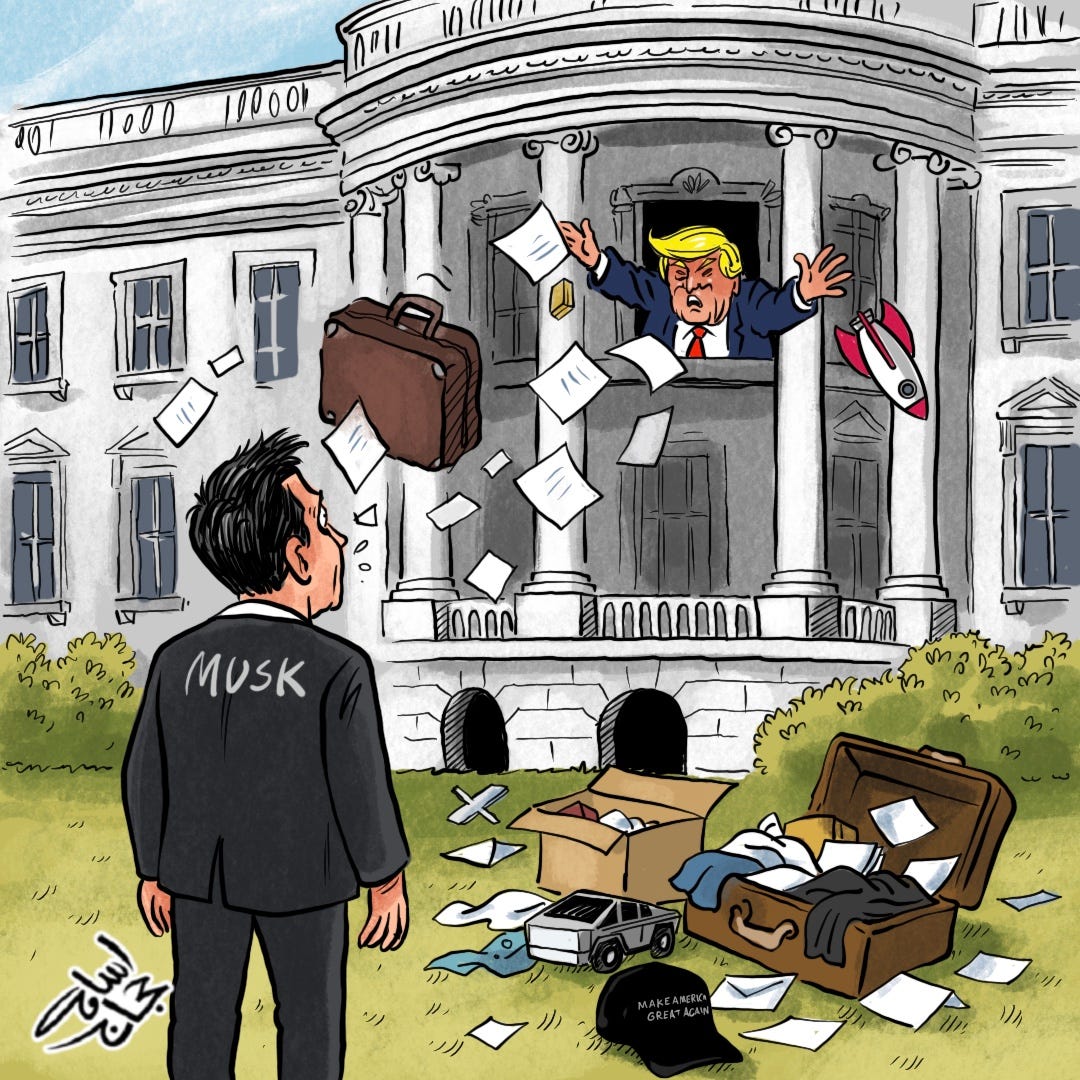Digital Trade and its Discontents
Dear Reader,
The past month’s newscycle has largely been dominated by the dangerous new conflict in the Middle East, with unprovoked strikes by Israel and the United States on Iran, and retaliatory attacks by the latter. As dubious justifications of preventing ‘dangerous nuclear weapons’ have been trotted out by these regimes, many have pointed out the stark parallels with the disastrous Iraq War of 2003. However, in an American media environment where more people get their news from social media than otherwise, this moment also marks a new era in the manufacturing of consent. That said, it is worth observing that purported attempts to ‘control the narrative’ using these channels have been quite mixed. In fact, while traditional media houses in the US were toeing the line of the establishment, independent digital media has actually served as a powerful critical voice against the war fervor. While disinformation was rampant online too, polls reveal that ordinary Americans remain far from convinced, perhaps in part because alternative flows of information have been robust.
Given all the uncertainty that there still is, it remains to be seen what framing of this troubled episode will finally prevail, and how it will be perceived by people at large. Whatever the outcome, it will have a lot to say about contemporary relations of power and their articulation with our digitalized public sphere.
In other news, June saw the US Senate pass the Genius Act, a legislation that is widely regarded as a step in bringing new legitimacy and government support to an ailing crypto industry. Ostensibly, what the bill does is provide a regulatory framework for the use of so-called stablecoins, crypto assets that maintain a one-to-one relation with the US dollar, that serve to facilitate liquidity within the cryptosphere and the wider economy. Yet, as tends to be the case with the world of finance, there is more at stake. Critical analysis, for instance, persuasively demonstrates the significance of this bill within Trump’s strategy to redefine the global trade order. By forcing its many partners to shift their dollar holdings into stablecoins, the US hopes to be able to devalue its currency while retaining its preeminent status in international trade. However, what is most alarming is that this strategy effectively diminishes the Federal Reserve’s capacity to regulate the currency, leaving its stability largely in the hands of the private sector, and Big Tech in particular. As the House of Congress now reviews the bill, it is worth tracking the major risks of financial catastrophe that it brings.
Moving to the corporate landscape, Big Tech has been fairly proactive in June when it comes to AI. Amazon has announced a mammoth 20 billion dollar investment to upscale its AI compute infrastructure, while Meta looks to acquire a 49% stake in Scale AI for USD15 billion. The latter company specializes in providing curated training data to major genAI companies, with Meta hoping that the alliance can help secure an edge for its own model in the ongoing AI arms race. In addition, Google, Microsoft, and Amazon have all been onboarded as partners in the UK government’s new AI skills program, which intends to train one million school students and 7.5 million workers in AI tools over the next five years. While this initiative is designed to tailor the British workforce to changing economic conditions, it harbors the risk of providing these Big Tech giants greater influence over local tech ecosystems, fostering long-term dependencies in the process.
Interestingly, in neighboring Europe, this past month has seen growing concern and backlash against precisely such Big Tech capture. In Denmark, following the decision of cities like Copenhagen and Aarhus, the national government has announced that it is moving its administration from the Microsoft software stack to open-source alternatives and that it also aims to drastically reduce its usage of Azure cloud servers. Soon after, the German state of Schleswig-Holstein also decided to cut ties with Microsoft. Across the board, the rationale for these decisions was a concern about digital sovereignty and a need to ensure independence for key pillars of state infrastructure.
Indeed, even at this year’s Internet Governance Forum, which is just concluding in Norway, the exorbitance of Silicon Valley monopolies has already been a major point of discussion. Global South voices, for instance, have been forcefully critiquing the decline in development funding and the need for empowering local capacities, rather than relying on Big Tech for tackling the persisting digital divide. Similarly, given the urgent concern about social media accountability and democratic crises, other sessions have seen strong arguments put forward for treating these platforms as public utilities.
All of this goes to show that, while current political realities have led to a lapse in effective multilateralism, there is simultaneously a strong appetite for genuine engagement and reform around what is increasingly seen as a broken system. As we look to the WSIS+20 High level Event next month, it is important to capture this energy and join forces with those currents of advocacy working towards a substantive vision of digital justice.
Returning to the current issue, this month on DatasSyn, we put the spotlight on digital trade. Bringing a critical lens to bear on the fallout of current trade tensions for the Global South, our different contributions look to make sense of the current conjuncture—the opportunities and dangers latent within it. Our first piece looks at how Trump’s trade wars are playing out in tense negotiations across the developing world. Our second piece hones in on the EU-US clash and the centrality of their respective tech sectors in this skirmish. Our third piece looks at how bilateral trade is evolving in these circumstances, taking a deep dive into the digital chapter of the recent India-UK agreement. Finally, our fourth piece highlights the relation between digital taxation and trade negotiations and the unique challenges they pose for African nations.
The Datasyn Team
THE BIG EXCESS
Trump’s Tariffs and the Big Tech Takeover
Abhineet Nayyar
In the wake of Trump’s liberation day tariffs–and their subsequent ‘pause’–global trade has been taking place under the shadow of major disruption as Trump continues to antagonize other nations, even as his team juggles dozens of negotiation processes in the backdrop. What has this tumult in international trade meant for the Majority World? Drawing on inputs from key perspectives across the South, Abhineet Nayyar maps the terrain.
Read on.
THE NEW DIVERGENCE
Between Tariffs and Tech: What Will Europe Choose?
Burcu Kilic
One of the most remarkable aspects of Trump’s berserk trade policy has been the extent to which it lashes out at its own friends and allies. The EU is a case in point, as its vaunted goals for building an indigenous digital ecosystem now hang in the balance of this stand-off. Burcu Kilic unpacks the tensions and dependencies of this troubled relationship and the way Big Tech’s interests loom large over the dispute.
Read on.
THE POLICY TABLE
Analyzing the India-UK FTA: Is India Giving Up Its “Digital Sovereignty” Dream?
Rishabh Bailey, Shobhit S, and Sadhana Sanjay
With the crisis in multilateral trade that the US has wrought, bilateral deals have once again moved centre stage in the regulation of trade relationships, and the digital chapters of these deals have a lot to say about the direction in which we are moving. In view of this, Rishabh Bailey, Shobhit S, and Sadhana Sanjay take a deep dive into the recent Free Trade Agreement between India and the UK, and what it reveals about India’s digital sovereignty ambitions.
Read on.
DIGITAL DISSENT
Trade Rules vs. Tax Rights: Africa’s Digital Dilemma
Sherina Poyyail in conversation with Karishma Banga
Digitalization has fundamentally altered the composition of international trade, as the flows of data and online commerce have rapidly gained in significance. What is often less well understood is that, in the process, digitalization has also recalibrated the landscape of taxation at the national level. Drawing on her recent research into this issue, Karishma Banga discusses the politics of this shift and how it adversely impacts the policy space and fiscal autonomy of poorer countries.
Read on.
The Sins & Synergies Lounge
The latest in the saga of corporate excess, check out this recent investigation by the Expose Accenture, the Movement Research Unit, and the Progressive International reveal the extent of the consulting firm Accenture’s involvement in large scale surveillance and security projects globally. Also read the Intercept’s investigation into Google’s maneuvers to evade Human Rights accountability checks in its controversial Project Nimbus.
Take a look at Gamelab’s study, which gathers evidence of bots bypassing robots.txt and crashing Galleries, Libraries, Archives, and Museums servers in early 2025 for AI training for a critical look at the cost of data mining on users’ access to online cultural heritage collections.
Put the Global Inequality Project on your radar for critical research and data on global inequality across key topics ranging from excess resource use to debt and financial outflows.
For a comprehensive analysis of the motivations and models driving the growing phenomenon of central bank digital currencies, read this insightful paper by by S. Yash Kalash.
Also watch this critical session at the Internet Governance Forum on making the WSIS+20 moment deliver digital rights and justice featuring critical civil society voices from the Global South.
If you haven’t heard of it already, make sure to explore the findings of this study by MIT Media Lab that has invigorated the debate on the cognitive impacts of using LLMs.
On a lighter note, listen to this conversation with the authors of the graphic novel “Power On!” on how computer science education can be personally and politcally empowering.
“We are vulnerable to coherence. We are moved by rhythm.” says psychotherapist Robert Saltzman on why the artifice of generative models’ personhood feels so compelling to us. Read this excellent reflection on a conversation with an LLM offering a peak into his book Understanding Claude.
Post-script
DataSyn is a free monthly newsletter from the Center for Global Digital Justice, featuring content hosted by Bot Populi.
DataSyn is supported through the Fair, Green and Global Alliance.
Have thoughts about what we carried? Want to contribute?
Contact us at newsletter.datasyn@centerforglobaldigitaljustice.org



